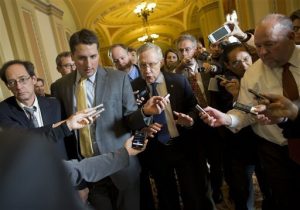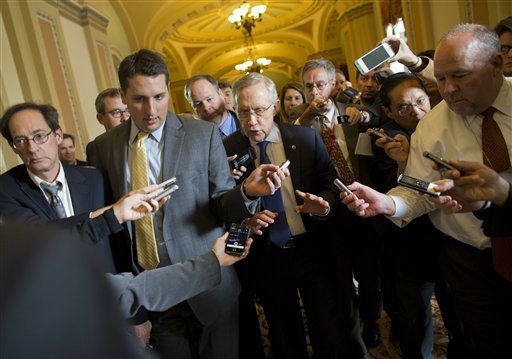
What is more productive than voting 42 times to repeal a law that has no chance of being repealed? What is more productive than structuring a bill, sending it to the House of Representatives, then modifying it, sending it back to them again and again and again? Back and forth, back and forth a bill goes, going from point A to point B to point A each time, altered to the same thing as before. Nothing really ever happens; everything stays the same. The actions of some Congressional representatives rightfully cause one to question whether members of the government really to prevent shutdown and default in the first place. Their actions, driven by intense resentments and bitter disagreements, are reckless, and hurt the US in the end.
For 16 days, this painful process ensued. Hard-line conservatives and Tea Party Republicans refused to discuss budget conversations or negotiate over the nation’s borrowing limit, as Democrats refused to defund President Obama’s signature yet controversial healthcare law. Standing firm against their political opponents, Democrats steadfastly ignored the cries to defund the law — legislation scrutinized and reviewed by all three branches of government, but passed and upheld by all three nonetheless. With neither side agreeing on budget talks, the debt ceiling, health care — or anything —almost 800,000 “nonessential” federal employees were furloughed. In addition, an S&P report found that the US economy lost 24 billion dollars over the 16 day period, a stinging statistic to the representatives in Congress who believed a government shutdown would save money and not have substantial economic effects. To make matters even worse for these representatives, members of both parties crafted a bipartisan agreement one day before the default, and the Democrats and Republicans who crafted the compromise rejected practically any changes to the health care law itself. The lawmakers added an anti-fraud provision to the act which requires stricter income verifications for individuals applying for federal subsidies, but other than this small tweak the law remains intact as it was prior to the shutdown drama.
Though criticisms of the Affordable Care Act may be justified, Tea Party Republicans use of it as the primary negotiating tool for reopening the government was questionable at best. First of all, a tactic such as this one indicates that these members of the government actually expected staunch Democrats and the President to entertain the idea of gutting their once in a generation kind of legislation — Obamacare. That is like Democrats in 2006 withdrawing funds from the Iraq War, and then saying if they could not they would let the nation default, recession ensue, millions of Americans suffer, and the World Economy collapse. They never did. Even if they abhorred the war to the similar extent Republicans despise Obamacare, Democrats never resorted to these kind of measures. Not only would that strategy be politically suicidal, but it would also fail to take into account the unpopular ramifications of stubbornness.
Conservatives, the real, Tea Party, small-government conservatives, were stubborn. The Obamacare saga is far from over, but this situation was a very inappropriate time to wage this kind of battle. It was a battle they had no chance of winning, and have no chance of winning if they employ the same old strategies — defund Obamacare, talk about how much you dislike Obamacare, how bad it will be for America. Then discuss how much you dislike Obama. Make no effort to reach out to minority voters, then become surprised when minority demographic groups, in numbers astronomically wider than at any time in the nation’s election history, overwhelmingly vote against you.
The criticism of these strategies is not unfair. Republican Mitch McConnell — the same politician who said Republicans number one priority should be to make President Obama a one term president — agrees. Discussing these strategies by Ted Cruz and others, he said, “All it does is shut down the government and keep Obamacare funded, and none of us want that” — a very good point in itself. The very same day, October 1, 2013, of the government shutdown was also the first day of healthcare enrollments. And again, the five years of Obamacare criticisms failed to cause people to not enroll. The website healthcare.gov saw 2.8 million — yes million — visitors on this date. Despite website problems, people are currently trying to sign up. In addition, Republican John McCain, well respected in the GOP establishment, called the defund Obamacare effort, “not rational”, stating they “don’t have 67 Republican votes in the Senate, which would be required to override a presidential veto.” Mccain is right: if Republicans want to have a shot at defunding Obamacare, they need a unified effort. However, the recent defund Obamacare effort fractured the Republican Party and leaves it divided to this day. Yet, so many conservative senators and members of Congress continue to be relentless in their efforts, most of which are a complete waste of time.
If the Tea Party portion of the Republican Party continues to use similar governing methods, the party’s popularity could take a beating. A recent gallup poll for October 22, 2013, revealed that only 28% of Americans approve of the Republican Party, while a mediocre 44% approve of the President. These are not great numbers for either side, but the 16 point edge for the President is certainly is eye-opening heading into the mid-term elections next year. Unsurprisingly, the large majority of the American public are not big fans of these strategies. In the end, though, what most Americans value is economic progress. The Republican Party, despite its recent history, has an opportunity to help America’s slow-growing, tepid economy. In the 2012 election, this was the issue. That is what they stressed. Yet, what economic solutions has either party produced since the election? Since then, they have not focused on an economy they once said was so important, not the unenmployed looking for work, but on destroying a healthcare solution, a critical piece of our economy that needs to be fixed. Republicans do not necessarily need to embrace Obamacare, but they do need to embrace healthcare reform, or minority groups, for instance, if they wish to help fix a broken government and find future success. The welfare of this country depends upon them to do so.









